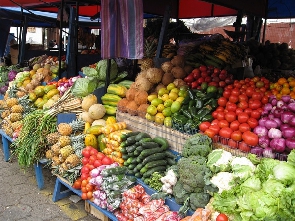The Consumer Advocacy Centre (CAC) at Laweh University College has asked the government to make legislations that protect consumers against the activities of market actors who benefit from high and unfair food prices on the market.
The advocacy is based on preliminary findings of a study that showed that weak competition in the food supply market and the dominance of some market actors such as Market queens and food aggregators have contributed significantly to unfair food prices in the Ghanaian market.
Sharing insights on the study at a stakeholder engagement, the President of CAC, Professor Goski Alabi indicated that between January 2022 and July 2023, consumers had had to bear the excessive burden of increasing cost of production over the period.
This has manifested in the hugely disproportionate rise in retail prices of food items compared to the wholesale prices of the same items over a period.
“The retail price of onions increased by 42.4 per cent while the wholesale price rose by just 18.1 per cent in the same period.
“The retail price of gari grew by 77 per cent compared to a 63 per cent rise in wholesale price and an increase of just 46.4 per cent in the whole sale price of cassava, the basic ingredient for gari,” she said.
She explained that the CAC in partnership with Consumers International, an international consumer advocacy body, deployed a tool called a ‘Fair Price Monitor’ to explore several potential reasons for the phenomenon.
She said that though reasons such as rising fuel costs, and weakening exchange rate were genuine factors for determining food prices, they did not appear sufficient for the excessive rise in retail prices.
She noted that the lack of standardisation of weight and measurement systems in the country also played a huge role in the unfair pricing of food.
Mr Wisdom Aborchie, an emunerator for the study in the Volta region, disclosed that while aggregators and wholesalers bought a kilo of mango at farmgate price at GH?5, they rather used the colour, size of the fruit to set the price at the retail level.
Dr Charles Nyaba, Executive Director of Peasant Farmers Association of Ghana, observed that small scale farmers and consumers were at the mercy of aggregators and market queens, who respectively determined the prices and the availability of commodities on the markets.
He said that farmers who mostly received unfair prices from aggregators and wholesalers for their wares despite the increasing cost of production were prevented by market queens from selling directly in the local markets.
Mr Edward Kareweh, the General Secretary of the General Agriculture Workers Union (GAWU), noted that even though there was no need for a price control regime, the pricing of food commodities could not be left to operation of market forces especially when the system to protect consumers and ensure market fairness was almost non-existent.
Business News of Sunday, 24 December 2023
Source: GNA













